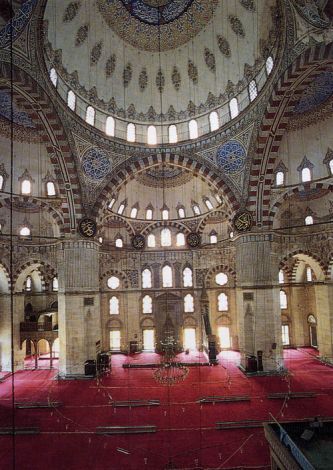RESAT NURI GÜNTEKIN (1889-1956)
The novelist, storywriter and playwright, Resat Nuri Güntekin was born in Istanbul, on 25 October 1889. Güntekin who wrote under various pen names such as Agustosböcegi, Atesböcegi, Cemil Nimet, Hayrettin Rüstü, Mehmet Ferit, Sermet Ferit, Mizah Yazari and Yildizböcegi, worked for long years in various schools as a Turkish literature and French language teacher and as an inspector for national education, but ended this his career in educational when he was elected as the Çanakkale, National Assembly Representative in 1939. In 1950, he was appointed to Paris as a Member of the Turkish Mission to UNESCO. Güntekin died on 13 December 1956 in London where he was receiving treatment for lung cancer.
Güntekin does not use a third person narrator and prefers to tell his stories through his characters, and this approach accounts for the plain language and easy-to-follow plots. For the same reason, the works of this prolific writer of his period were loved by the masses. Güntekin’ works dealt with the social events of his time and their impact on the individuals, and provided his readers with guidance and hope in dealing with the changing conditions to of the era. Because of all this, it would be fair to consider Resat Nuri Güntekin as a “social realist” writer.
Although known mostly as a novelist Güntekin has written many plays as well. Prof. Dr. Sevda Sener, in her article entitled “Cumhuriyet Dönemi Tiyatro Yazarligi” has summarized the spirit of the era; “Writers who have placed their revolutionary, idealist character or their patriotic character in a conflicting environment and who dealt with the ensuing crisis, have managed to give depth to their characters.” She has indicated Resat Nuri Güntekin as one of the best examples of the period. In his plays and mostly in his novels Güntekin aimed at educating the spectators and reminding them of their duties toward society. The main ideas in his novels and plays are communicated to the spectator or the reader directly. All these reasons accounted for the success of Resat Nuri Güntekin, as a writer read and enjoyed by the masses of this time.
Resat Nuri Güntekin was not only a popular writer of his period but also one of the prominent names of the history of Turkish literature and drama.
Resat Nuri Güntekin’s novels are Çalikusu (Gold Crest, 1922), Dudaktan Kalbe (From Lip to Heart, 1923), Gizli El (The Secret Hand, 1924), Damga (The Stamp, 1924), Aksam Günesi (Evening Sun, 1926), Bir Kadin Düsmani – Çirkinin Romani (A Misogynist – Novel of the Ugly, 1927), Yesil Gece (Green Night, 1928), Acimak (Feeling Pity, 1928), Yaprak Dökümü (Shedding of Leaves, 1930), Kizilcik Dallari (Hickory Branches, 1932), Gökyüzü (The Sky, 1935), Eski Hastalik (The Old Illness, 1938), Ates Gecesi (Night of Fire, 1942), Degirmen (The Mill, 1944), Miskinler Tekkesi (The Convent of the Idle, 1946), Harabelerin Çiçegi (The Flower of Ruins, 1953), Kavak Yelleri (Poplar Winds, 1961), Son Siginak (The Last Refuge, 1961), Kan Davasi (Blood Feud, 1962) and Ripka Ifsa Ediliyor (Ripka Exposed) which was composed in 1949.
Resat Nuri Güntekin’s stories are entitled Recm-Gençlik ve Güzellik (Killing Youth, and Beauty, 1919), Roçild Bey (Mr. Rothschild, 1919), Eski Ahbap (The Old Pal, 1923), Tanri Misafiri (Guest of God, 1927), Leylâ ile Mecnun (Leylâ and Mecnun, 1928), and Olagan Isler (Business as Usual 1930).
Güntekin’s plays are Hançer (The Dagger, 1920), Eski Rüya (The Old Dream, 1922), Ümidin Günesi (The Sun of Hope, 1924), Gazeteci Düsmani/Semsiye Hirsizi/Ihtiyar Serseri (The Journalist Hater / The Umbrella Thief / The Old Tramp 1924), Tas Parçasi (Piece of Rock, 1926), Bir Köy Hocasi (A Village Teacher, 1928), Babür Sah’in Seccadesi (The Prayer Rug of Babür Shah, 1931), Bir Kir Eglencesi (A Prairie Party, 1931), Ümit Mektebinde (In the School of Hope, 1931), Felaket Karsisinda/Gözdagi/Eski Borç (In The Face of Calamity / Intimidation / The Old Debt, 1931), Istiklal (Independence, 1933), Vergi Hirsizi (The Tax Evader, 1933), Hülleci (The Re-Marriage, 1935), Bir Yagmur Gecesi (A Night of Rain, 1943), Yaprak Dökümü (Shedding of Leaves, 1971), Eski Sarki (Old Song, 1971), Balikesir Muhasebecisi (The Accountant of Balikesir, 1971), and Tanridag Ziyafeti (Feast in the Divine Mountain, 1971). Resat
Nuri Güntekin who has written countless articles and studies has also translated many works *.
* Biographical information concerning Resat Nuri Güntekin has been gathered from Tanzimat’tan Bugüne Edebiyatçilar Ansiklopedisi.
Reference: Yesim Gokce (Bilkent University)/Turkish Cultural Foundation, photograph courtesy of Ara Guler.








